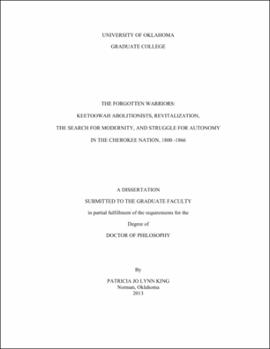| dc.contributor.advisor | Metcalf, Warren | |
| dc.creator | King, Patricia Jo Lynn | |
| dc.date.accessioned | 2019-04-27T21:26:39Z | |
| dc.date.available | 2019-04-27T21:26:39Z | |
| dc.date.issued | 2013 | |
| dc.identifier | 99199091302042 | |
| dc.identifier.uri | https://hdl.handle.net/11244/318707 | |
| dc.description.abstract | My research focuses on the revitalization of the Cherokee Keetoowah | |
| dc.description.abstract | Society in 1858 in Indian Territory just twenty years after the tribe's removal from their southeastern homelands. I contend that `Keetoowah' was much more than just a religious organization with political undertones. Keetoowah represented an entire way of life, a way to order society, to provide a cultural backbone for the community, and to give meaning to their rapidly changing world. Rather than escaping modernization by tying themselves to the past, the Keetoowahs used selective adaptation to reconstruct a unique sociopolitical system that allowed them to engage in progressive interaction both | |
| dc.description.abstract | inside and outside their communities. . | |
| dc.description.abstract | Even in earliest known times, the Keetoowahs occupied shifting roles | |
| dc.description.abstract | within Cherokee society, sometimes acting as religious leaders and sometimes as war leaders depending on necessity, as well as their individual level of experience and achievement. This is very much in keeping with the overall nature of the historic Cherokee social structure itself, with its focus on both gadugi (the collective good) and on personal independence. In the antebellum years, the Keetoowahs were deeply engaged in the mainstream socioeconomic trends and debates of the day; education, capitalism, industry, fraternalism, politics, and labor issues, particularly slavery. In their role as religious men, they accepted the | |
| dc.description.abstract | faith and support of the `emancipating Baptist' missionaries around them, and as warriors, they fought tirelessly to abolish slavery in the Cherokee Nation, a struggle that led directly to the Society's revitalization. | |
| dc.format.extent | 366 pages | |
| dc.format.medium | application.pdf | |
| dc.language | en_US | |
| dc.relation.requires | Adobe Acrobat Reader | |
| dc.subject | Cherokee Indians--Societies, etc | |
| dc.subject | Cherokee Indians--Ethnic identity | |
| dc.subject | Secret societies--Oklahoma--History | |
| dc.title | The Forgotten Warriors: Keetoowah Abolitionists, Revitalization, the Search for Modernity and the Struggle for Autonomy in the Cherokee Nation, 1800-1866 | |
| dc.type | text | |
| dc.type | document | |
| dc.thesis.degree | Ph.D. | |
| ou.group | College of Arts and Sciences::Department of History | |
